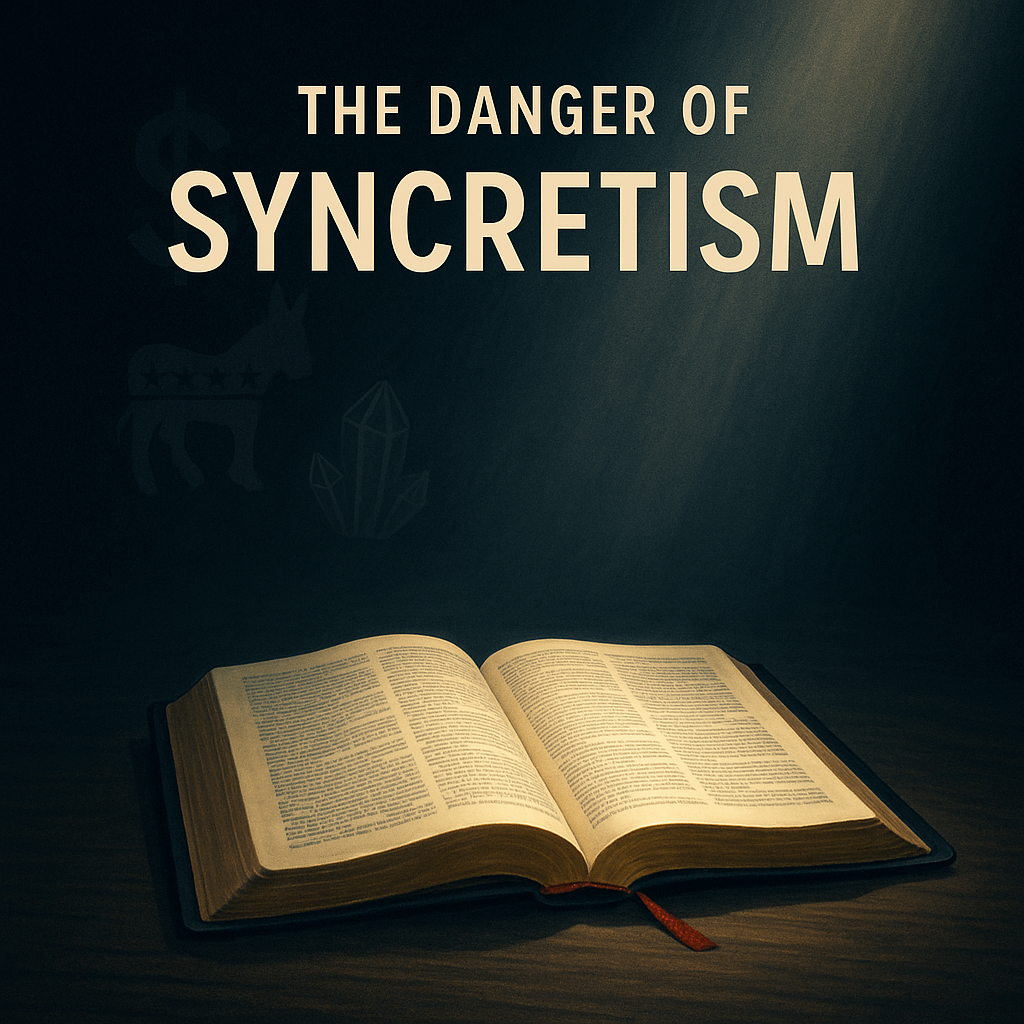⏱️ Estimated Reading Time: 3 min read
The Danger of Syncretism in the Church
Contending for the Word – September 13, 2025
Written by Dave Jenkins
What is the danger of syncretism in the church? This important question faces every generation of believers. Syncretism is the blending of Christianity with non-Christian beliefs, practices, or worldviews. Instead of standing on the sufficiency of God’s Word, syncretism seeks to mix biblical truth with cultural philosophies, pagan practices, or worldly ideologies.
In the Old Testament, Israel often fell into syncretism by combining the worship of Yahweh with idols and pagan rituals (2 Kings 17:33). Today, syncretism can appear more subtle, but it is no less dangerous.
Examples of Syncretism Today
Some ways syncretism shows up in the modern church include:
- Mixing Christianity with New Age spirituality, such as yoga, mindfulness, crystals, or astrology.
- Blending biblical truth with political ideologies, so that partisan loyalty outweighs gospel fidelity.
- Adopting secular self-help philosophies, then wrapping them in Christian language.
- Compromising worship, by adopting practices aimed at emotional manipulation rather than biblical fidelity.
- Interfaith cooperation, treating all religions as equally valid pathways to God.
Why Syncretism Is Dangerous
Syncretism undermines the very heart of the Christian faith in several ways:
- It distorts the gospel, since adding anything to Christ results in a “different gospel” (Galatians 1:6–9).
- It divides our allegiance, because Jesus said no one can serve two masters (Matthew 6:24).
- It leads to idolatry, blending false practices with worship and serving created things rather than the Creator (Romans 1:25).
- It dulls discernment, when error is tolerated alongside truth, Christians lose the ability to distinguish good from evil (Hebrews 5:14).
- It dishonors God’s holiness, for God calls His people to be holy and set apart (1 Peter 1:15–16), not to dilute His truth with worldly error.
A Biblical Response
The antidote to syncretism is a firm commitment to the Word of God:
- Hold fast to sound doctrine, remembering Scripture is sufficient for life and godliness (2 Timothy 3:16–17, 2 Peter 1:3).
- Guard the gospel, for we are saved by grace alone, through faith alone, in Christ alone (Ephesians 2:8–9).
- Practice discernment, testing every teaching and practice against Scripture (1 Thessalonians 5:21, Acts 17:11).
- Pursue holiness, refusing to be conformed to the world (Romans 12:2).
- Center on Christ, who alone is the way, the truth, and the life (John 14:6).
Conclusion
Syncretism may seem harmless or even appealing, but it is a subtle pathway to compromise and spiritual destruction. The danger lies not just in what is added to Christianity but in what is lost, the purity of the gospel and the glory of Christ.
The church must resist the temptation to blend truth with error. Instead, we must remain anchored in God’s Word, proclaim Christ alone, and worship the Lord in spirit and in truth.
As Joshua declared to Israel, so must we declare today: “Choose this day whom you will serve… But as for me and my house, we will serve the LORD” (Joshua 24:15).
For more from Contending for the Word Q&A please visit our page here at Servants of Grace or our YouTube.
Dave Jenkins is happily married to his wife, Sarah. He is a writer, editor, and speaker living in beautiful Southern Oregon. Dave is a lover of Christ, His people, the Church, and sound theology. He serves as the Executive Director of Servants of Grace Ministries, the Executive Editor of Theology for Life Magazine, the Host and Producer of Equipping You in Grace Podcast, and is a contributor to and producer of Contending for the Word. He is the author of The Word Explored: The Problem of Biblical Illiteracy and What To Do About It (House to House, 2021), The Word Matters: Defending Biblical Authority Against the Spirit of the Age (G3 Press, 2022), and Contentment: The Journey of a Lifetime (Theology for Life, 2024). You can find him on Facebook, Twitter, Instagram, Youtube, or read his newsletter. Dave loves to spend time with his wife, going to movies, eating at a nice restaurant, or going out for a round of golf with a good friend. He is also a voracious reader, in particular of Reformed theology, and the Puritans. You will often find him when he’s not busy with ministry reading a pile of the latest books from a wide variety of Christian publishers. Dave received his M.A.R. and M.Div through Liberty Baptist Theological Seminary.




